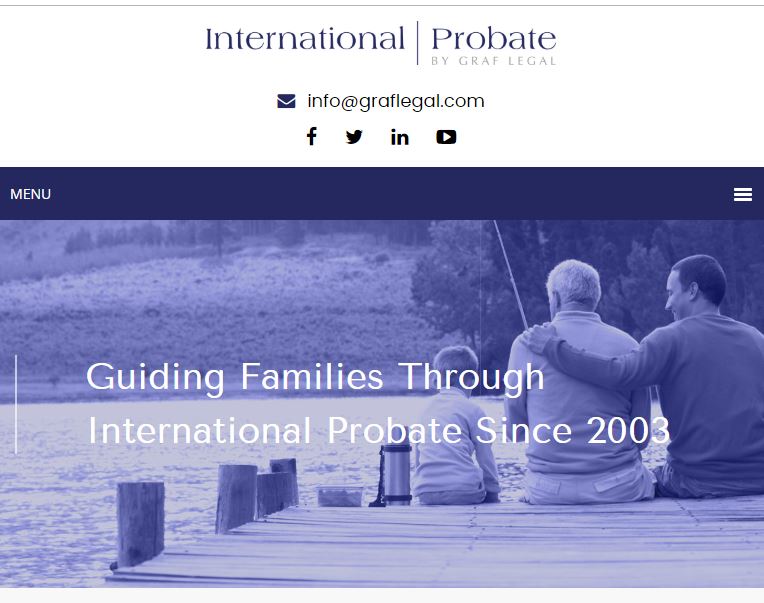
German Succession Rules and Probate Proceedings explained
German inheritance law as well as German probate rules differ very much both from UK law as well as USA probate. Under German statutory law, there are many formal requirements which must be followed. A good source for initial informationis about the law of succession in Germany (or any other European country for that matter) is the official EU website “Successions in Europe“. It answers a few basic questions and contains helpful links for more detailed research. In our CrossChannelLawyers blog we try to dig deeper in regard to many issues of British-German and US-German succession rules, inheritance tax, estate planning and international probate.
In case you really need to deal with an overseas estate in Germany, Austria or Switzerland, please visit the expert blog InternationalProbateLaw.com which we have created specifically for English speaking clients.
For starters, let us quickly explain some major differences between UK and German laws of succession:
One fundamental difference between UK and German inheritance law, having huge impact on probate procedures, is the German “principle of universal succession“. While in the UK the rule is that a personal representative takes possession of the estate and will eventually distribute the (remaining) property to the beneficiaries the German system is completely different: Here the heir immediately and directly acquires all assets and even all liabilities of the deceased. In other words: all rights and obligations that the deceased person had are automatically transferred onto the heir, the second the devisor dies. Neither a court ruling is necessary, nor a personal representative, executor or trustee. Now, a German heir will in most cases still need a grant of probate (called “Erbschein“) because banks, insurance companies etc will want to see this document for their own protection. If there is more than one heir (for example the surviving spouse and children of the deceased), they form a so called “Erbengemeinschaft”, a “community of heirs”. They own the estate together and have to agree between themselves on how to divide and distribute the assets among them. Which quite often leads to quarrels and legal disputes. So most German inheritance lawyers recommend to draft a will in which the testator (i) either names only one heir and orders this heir to pay out bequests (Vermächtnisse) to the other beneficiaries or (ii) name more than one heirs but include in the will how this shall be distributed among them.
The principle of universal succession also has the effect that the heirs are personally liable for all debts that the deceased had (details here). This can be very dangerous if the heirs are not aware of such debts because there is a six week deadline to reject one’s right as heir. After these six weeks the inheritance is legally being regarded as accepted and the heir must pay all debts of the deceased even if the debts are higher than the assets. Therefore, an heir in Germany should examine all documents and evaluate whether there is a risks ob the estate being insolvent.
A third major difference is inheritance tax: While in the UK there is one nil-rate band for the entire estate and the amount above that is taxed with 40 percent, the German situation is much more complicated. Not the estate as such is being taxed but each individual beneficiary must evaluate for himself whether he has to pay inheritance tax and is personally responsible to contact the tax authorities. Thus, in contrast to the UK, German probate courts will issue the Erbschein without regard to taxation issues. Spouses and close relatives have rather high tax exempt amounts (Steuerfreibeträge), a spouse for example has 500,000 Euros plus (!) the familiy home; each child has 400,000 Euros. Beneficiaries that are not closely related to the deceased, however, have much less tax exempt amounts (usually 20,000 Euros) and must also pay higher tax rates than close family members (details in the table of German IHT rates here). So one cannot generally say whether an heir is better off according to German or UK inheritance tax laws, it all depends on the individual situation.
Then, finally, there is the infamous “Pflichtteil” (“forced share“, “elective share” or “compulsory share“) which the spouse and other close relatives can claim if they are disowned in a will. The details of this legal concept are explained here and here.
In you prefer watching videos instead of reading one post after another, check out our clip “The 24 Most Frequently Asked Questions on Foreign Probate” on YouTube
For more information on cross border probate matters, international will preparation and German inheritance tax matters see the below posts by the international succession law and tax law experts of German law firm Graf & Partners LLP:
- International ProbateLaw – The Experts on Overseas Probate
- Brochure on German Probate and German Inheritance Tax (in English)
- Most Germans die without a Will (German Intestacy Rules)
- Does a German Last Will and Testament become void if the Testator later marries or has children?
- Formal Requirements to set up a valid Will in England, Scotland and Germany: What are the Differences?
- The Perils of German IHT and Gift Tax
- How to access German assets without going through Probate
- Careful with Deed of Variation if Estate comprises Foreign Assets
- Basics of German Inheritance and Succession Law
- Executors and Trustees in German Inheritance Law
- How to apply for a German Grant of Probate
- The Infamous German Community of Heirs – And how to avoid it
- Germans Heirs are Personally Liable for Debts of the Deceased
- International Wills and Estate Planning for British-German Families
- Prove German Wills for English Probate
- Disputed Wills and Contentious Probate in Germany
- Disinherit your no-good children? Not so easy in Germany
- Don’t be afraid of Clients with Foreign Assets!
- Can foreign Taxes be set off against UK Inheritance Tax?
Or simply click on the “German Probate” section in the right column of this blog.
The Anglo-German law firm Graf & Partners and its German-English litigation department GP Chambers was established in 2003 and has many years of experience with British-German and US-German probate and tax matters, including the representation of clients in contentious probate matters. We are experts ininternational succession matters, probate and inheritance law. If you wish us to advise or represent you in a German or cross border inheritance case please contact German solicitor Bernhard Schmeilzl, LL.M. (Leicester) at +49 941 463 7070.



[…] For those that want to get into the legal technicalities, the relevant statutes of the German Civil Code (Bürgerliches Gesetzbuch) are available here in English language. More information on German succession law is available here […]
[…] substantive law of succession and the major differences between English and German inheritance law are explained here, including the issue of the infamous German “forced or compulsory share” of close […]
[…] exist, as we have explained here, fundamental differences between the inheritance law concepts of the UK and Germany. Since UK […]
[…] German inheritance law works by the principle of universal and direct succession, i.e. the heirs automatically become the owners and possessors of the entire estate, i.e. all assets that the deceased had owned (by the way: they also inherit all the debts of the deceased). Details are explained here. […]
[…] inheritance law, including inheritance tax law, works very differently from the UK system (for German probate see here). While in the UK the estate as such is taxed (with one single nil-rate band of currently 325k GBP […]
[…] we have explained here, German inheritance law applies the principle of universal succession (Gesamtrechtsnachfolge) which […]
[…] we have explained here, German law applies the principle of direct and universal succession. This means that the estate […]
[…] to the German principle of direct and universal succession, which is explained in more detail here (http://www.crosschannellawyers.co.uk/basics-of-german-inheritance-law/), the heirs become heirs automatically, if they like it or not. They have to actively disclaim the […]
[…] to the principle of universal and direct succession (details here) there is no need for a personal representative. A German heir, so to speak, is his/her own […]
[…] Since Germany and the UK apply very different rules in regards to both areas described above, the systems are not compatible and the results hugely differ when you look at the matters from a German or from a UK perspective. The German rules of succession (direct and universal succession) are explained here […]
[…] Representative”. Instead German inheritance law applies the principle of direct accession (more on this here). That is all very nice and efficient if there is only a sole heir. Or if, in case there are […]
[…] Basics of German Inheritance and Succession Law […]
[…] Basics of German Inheritance and Succession Law […]
[…] Basics of German Inheritance and Succession Law […]
[…] administration of the estate by a personal respresentative. Instead, in Germany (as in France) the heirs inherit their share of the estate of the deceased directly on death and automatically assume responsibility […]
[…] Basics of German Inheritance and Succession Law […]
[…] The German notion is: “Das ist Privatsache!” (This is private business). In some cases not even close relatives have a right to be shown the will of their relative if they are not heirs (for details see: Basics of German Inheritance Law). […]
[…] Basics of German Inheritance and Succession Law […]
[…] Basics of German Inheritance and Succession Law […]
[…] Basics of German Inheritance and Succession Law […]
[…] Basics of German Inheritance and Succession Law […]
[…] Basics of German Inheritance and Succession Law […]
[…] Basics of German Inheritance and Succession Law […]
[…] Basics of German Inheritance and Succession Law […]
[…] Basics of German Inheritance and Succession Law […]
[…] Basics of German Inheritance and Succession Law […]
[…] Basics of German Inheritance and Succession Law […]
[…] Basics of German Inheritance and Succession Law […]
[…] Basics of German Inheritance and Succession Law […]
[…] Basics of German Inheritance and Succession Law […]
[…] Basics of German Inheritance and Succession Law […]
[…] Basics of German Inheritance and Succession Law […]
[…] Basics of German Inheritance and Succession Law […]
[…] Basics of German Inheritance and Succession Law […]
[…] Basics of German Inheritance and Succession Law […]
[…] Basics of German Inheritance and Succession Law […]
[…] Basics of German Inheritance and Succession Law […]